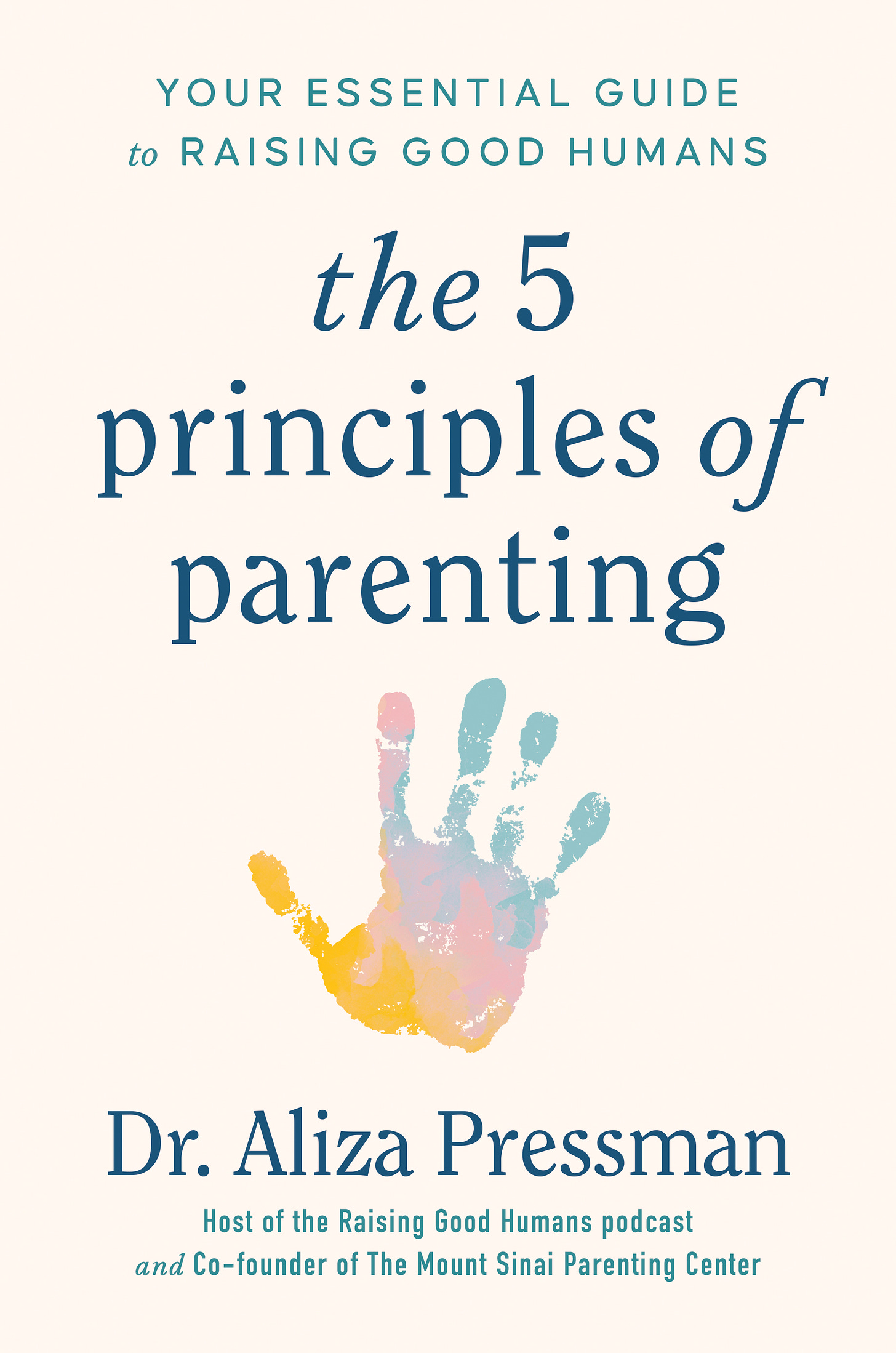Thanks for reading Raising Good Humans on Substack! My first book, The Five Principles of Parenting: Your Essential Guide to Raising Good Humans is now available for purchase here.

One of our deepest desires is for our children to feel confident, loved, and worthy. But what happens when we sense that our child is struggling with something far more profound… self-hatred? It's a difficult and often heartbreaking realization. This week’s episode of the Raising Good Humans Podcast features renowned Harvard psychiatrist, Dr. Blaise Aguirre. Together in this conversation, we aim to help parents understand what real self-hatred is, how to distinguish it from typical self-deprecation, and what techniques we can employ to help our children navigate these challenging feelings.
What is self-hatred, really?
It's crucial to differentiate between self-hatred and typical self-deprecation. Many of us, including our children, may occasionally say things like "I'm so stupid" after making a mistake or "nobody likes me" after a social setback. These statements, while valid and real, are often transient reactions to specific events. They don't necessarily indicate deep-seated self-hatred. Self-hatred is not just having a bad day or occasionally feeling disappointed in oneself. It's a deep-seated belief that there is something fundamentally flawed, broken, or undeserving about who they are as a person. This true self-hatred is not transient. It's not something that changes when the sun comes out or after a good meal. Instead, it's an internal belief that "the things that are making life difficult don't lie without, but actually lie within."
Self-hatred is also persistent, pervasive, and all-consuming. It's a constant narrative that "I am not worthy," "I am broken," or "I am a burden." It's not just about a single incident but a fundamental belief about oneself. It's the difference between saying, "I messed up on that test," and "I'm just not smart."
Though many parents do not notice or intend to, this core belief is often ingrained from a young age. Children learn self-hatred through experiences that tell them they are unworthy, not good enough, or deserving of punishment. These experiences can range from constant comparisons with siblings to bullying, abuse, or even seemingly innocuous comments like "you're lazy." For children experiencing this, self-hatred becomes their "water" — the only reality they know.
What to do for a child experiencing self-hatred?
Listen with genuine curiosity. Instead of dismissing or contradicting your child's statements, listen with deep, genuine curiosity. If your child says, "I hate myself," don't immediately say, "Don't say that! You're amazing!" Instead, try asking, "What happened today that made you feel that way?" or "Tell me more about what you're feeling." This approach validates their feelings and opens the door for a deeper conversation.
Explore the source. Help your child explore where these feelings come from. Dr. Aguirre suggests asking, "Who taught you to feel this way about yourself?" This might seem like a bizarre question, but it encourages your child to identify the people or experiences that contributed to their negative self-image. It could be a critical family member, a bullying classmate, or even a coach. By identifying these "teachers," your child can begin to understand that these beliefs were learned, not inherent.
Build critical thinking muscles. Encourage your child to critically evaluate their thoughts and feelings. As you explore why they feel a negative thought, try saying, “I know that wasn’t pleasant, but how does it connect to hating yourself?” Help them challenge their negative thoughts with perspective and reflection.
Distinguish between transient feelings and persistent beliefs. Help your child differentiate between the two. It's okay to have a bad day or feel disappointed in oneself. But if these negative feelings become a constant narrative, it may be a sign that something deeper is going on.
Avoid problem-solving immediately. Resist the urge to jump in and solve your child's problems. Instead, focus on listening and validating their feelings. Sometimes, just being heard and understood is enough. Offer help and support, but let your child take the lead.
Teach emotion regulation skills. Many children struggling with self-hatred are highly sensitive and lack the skills to manage their strong emotions. Consider teaching them emotion regulation techniques like deep breathing, mindfulness, or journaling. Dialectical Behavior Therapy (DBT) can be particularly helpful in managing intense emotions.
Model self-compassion. Children learn by observing their parents. Model self-compassion in your own life. Be kind to yourself when you make mistakes, and talk about your feelings openly. This teaches your child that it's okay to be imperfect and that self-compassion is essential.
Be mindful of social media. Social media can exacerbate feelings of self-hatred, especially for sensitive children. Be mindful of your child's social media use and talk to them about the unrealistic expectations and comparisons that often arise. Help them understand that what they see online is often a curated version of reality.
Seek professional help. If your child's self-hatred is persistent, pervasive, and impacting their daily life, don't hesitate to seek professional help. A therapist can provide a safe space for your child to explore their feelings and develop coping strategies.
Remember temperament. Every child is unique, and their temperament plays a significant role in how they experience and process emotions. Some children are naturally more sensitive than others. In the episode, Dr. Aguirre uses the metaphor of a peanut allergy to explain how different children react to criticism. He suggests that for highly sensitive children, even a small, seemingly innocuous comment like "you're lazy" can be like a peanut to someone with a severe allergy, triggering a strong, negative reaction. In contrast, for less sensitive children, these comments are like peanuts to someone without an allergy — they can "eat a bunch of peanuts and move along," experiencing no adverse effects. This metaphor highlights how temperament influences a child's response to criticism and the need for different approaches in parenting and communication.
Addressing self-hatred in children is a complex and challenging process. It requires patience, empathy, and a willingness to listen without judgment. Though this is hard, thinking in this way can help our children develop self-compassion, build resilience, and ultimately realize their inherent worth.
A quick reminder to buy my first book, The Five Principles of Parenting, and write a review from wherever you order. Reviews really help to get the book noticed, and to spread the word. Please especially rate and review any books purchased on Amazon (it shockingly really, really matters!). Also, when you receive the book, snap a quick pic with it and post on social media. Share one thing you love about it and help me to get more copies into the hands of parents in your community. Tell a friend about the book, or about something you found helpful in the book. Parents look to each other for advice, and I’d love to be a part of the support you pass on to your loved ones.






Thank you for this clear and super-helpful guide 🙏✨🥰 I look forward to listening to the Podcast episode later 👍
this is so helpful! would you flag any other content to parents of highly
sensitive children?